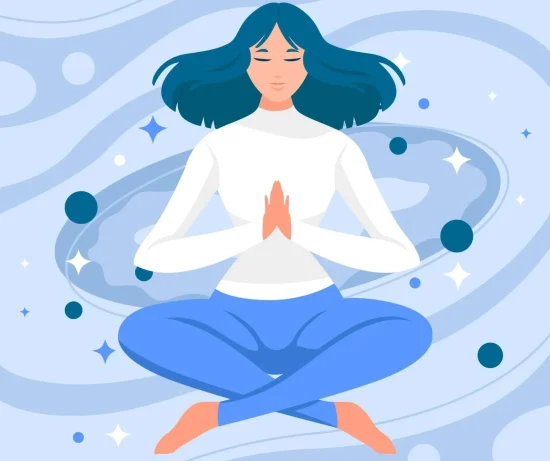
The Quiet Effects of Chronic Stress: How To Overcome It?
Everyone knows that stress is not good for us. However, one pertinent question is – how do we end up becoming chronically stressed? If we know that stress isn’t good for us, why don’t we do something to minimize the stress sooner?
A part of the reason is – very often, we are not even aware that we are stressed. Stress keeps building up in a mild but chronic manner within, and we don’t even realize it.
Let’s do a tiny check-in to understand this better-
How often are you:
- Preoccupied in thought
- Absent-minded
- Zoning out of conversations
- Low on patience
- Prone to being impulsive
- Restless and wired up
- Constantly shaking your foot, feeling fidgety
- Feeling listless and lethargic
- Finding it hard to put down the phone, switch off the laptop or tv, even if you know you need to
- Not able to bring about change in certain habits or patterns, even if you wish to
- Not able to introspect
- Not able to understand what you truly feel
These situations are so common that we don’t really make much of it. We may not even notice when they happen. However, it is important to know that these things aren’t just “quirks.” These are hidden, often quiet symptoms and effects of chronic stress.
What Is Chronic Stress?
Stress, in simple terms, is your body preparing you to either fight a threat or flee from it.
However, there are just so many things that can get us feeling mildly threatened – the coffee going cold before you drink it, your roommate turning the fan off when you want it on, missing that bus or train, your children needing you when you want those minutes to yourself, your spouse coming back home in a bad mood, your boss looking unhappy with your suggestions… need we move to more serious situations?
Enough happens in our daily lives that we don’t recognize we are feeling stressed in the present moment. We don’t recognize that our bodies feel mildly wired, and that we don’t feel at rest. We tell ourselves we have dealt with the situation and moved on. However, we don’t move on completely.
We carry some residual stress with us. For instance, we still might be thinking about our spouse, boss or child while having a meal hours later. We might be slightly more restless for the rest of the day. We may not eat well, or eat a bit too much. We may feel distracted. We may have bad dreams that night or even the next. These are ways how our system carries chronic, residual stress.
When our system keeps accumulating stress this way, and we do not get enough opportunity to reset our mind and body, we end up carrying some stress chronically. Being in a chronically stressed state can lead to longer term effects such as-
- Constant thinking, brooding, rumination
- An inability to truly rest and be
- Resting physically but being tired mentally
- Difficulty with concentration and focus
- Feeling irritable, tired, short tempered
- A tendency to snap or overreact
- Anxiety, constant worry
- Mental confusion, lack of clarity
- Burnout
- Addictive habits – right from alcoholism and smoking to binge eating, binge watching and so on
- Vulnerability to headaches, digestive issues, reproductive problems, hypertension and other or physical illnesses.
- Difficulty sleeping
- Reduced immunity
- Relationship difficulties owing to the state one is in.
When we are in a state of chronic stress, we are constantly caught up in some form of thought. We constantly live in our heads.
Sometimes, we go through our daily routine in an almost mechanical way. We do what we are doing, but we feel hazy and disconnected inside. We wish to understand what is going within us, but when we try, so many thoughts and confusion comes up that we look away and into the next TV series to get into, in order to lighten up.
This state is like your nervous system being stretched like a rubber band and then being held in a stretched position. It cannot work in unison with all your other mental and emotional faculties to support yourself.
Instead, it’s in survival mode, simply getting through each day and seeking some pleasure from time-to-time to help push yourself forth. Despite the momentary pleasures, you are not able to truly help yourself manage and reduce chronic stress meaningfully.

Research On Mindfulness
Eager to learn more about mindfulness?
We have gathered all of the recent studies on the benefits of mindfulness to help you unlock the path to greater well-being and mental clarity.
Mindfulness: The Antidote To Chronic Stress
Most of us aren’t even aware of the stress we carry in our bodies. And thus, we do not do anything to address the stress.
Mindfulness is the “antidote” to chronic stress. Since mindfulness is all about being in the present, it gently works with the state of chronic stress. It works with our tendency to be in chronic stress, being unaware, getting caught up in the head, remaining disconnected with ourselves, and zoning out to the next distraction.
One of the main reasons to learn mindfulness is due to its ability to help you stay rooted in the present, and work on reducing the load of chronic stress from your system.
How Does Mindfulness Help To Manage Chronic Stress?
When you train in mindfulness, you train in noticing yourself, as you are without judgement and with total acceptance of whatever arises.
When you are able to be with yourself for longer spans of time, something powerful happens.
The brain becomes rewired to drop stressful tendencies. It learns to recognize its present state better. It learns to drop automatic thinking more easily and come back to the moment. It can learn to recognise difficult sensations, difficult feelings without having to suppress it or shut it out. You are able to access what you are really feeling instead of just going with the first thought that occurs, or getting stuck in analysis paralysis.
Needless to say, your ability to work with yourself gets better. You are able to catch yourself much sooner when you are getting dysregulated, stressed, angry, too caught up in thought, too worried and so on.
You realize in time, for example, that your head is hurting with the loud volume even though you’re intently watching your favorite show; that you are now feeling full and can stop eating; that you are in an annoyed state right now and so should have that conversation later (or have it now, depending on what is best for you).
As you train more, you become more aware of your deeper emotional states too. Because you are more aware, you are also clearer on what is needed in the moment to help yourself feel better. You don’t just reach for the next cup of tea when you are stressed, for example. You are able to decide more consciously whether a break and a cup of tea is what you need, or whether it’s an opportunity to vent or engage in some problem-solving/direct confrontation with the source of stress. You feel clearer about what is going on with you and what you truly need to do to help yourself. This ability goes a long way in helping you truly minimize and manage stress in the long term.
This is easier said than done, but its possible and definitely worth it. You can learn mindfulness through mindfulness apps and online resources for a start, or learn from a teacher for deeper understanding and practice. Whatever practice is possible for you, if done consistently, can definitely be of help. By being mindful, you begin to heal from chronic stress, and thrive.
May you be well, may you be happy 🙂
About the Author
This article was written by Malini Krishnan, Psychologist and Mindfulness Trainer at Inner Space.
Ask a Therapist
If you are interested to know more about mindfulness, meditation or any related topic, ‘Ask A Therapist’ is a platform for you to ask your questions related to Mental Health, Mindfulness & Emotional Well-Being to our team of qualified Therapists and Mindfulness Trainers.





